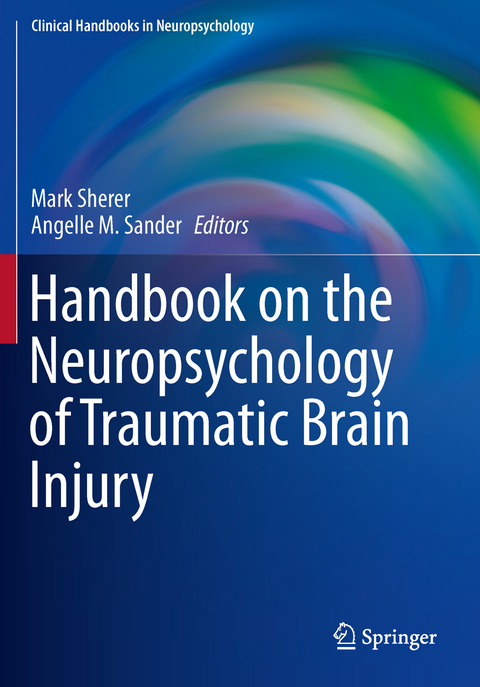
Handbook on the Neuropsychology of Traumatic Brain Injury
Springer-Verlag New York Inc.
978-1-4939-3225-2 (ISBN)
Bedside evaluations in TBI.
Outcome assessment in TBI.
Collaborating with family caregivers in the rehabilitation of persons with TBI.
Behavioral assessment of acute neurobehavioral syndromes to inform treatment.
Pediatric TBI: assessment, outcomes, intervention.
Special issues with mild TBI in veterans and active duty service members.
Expanding professional knowledge on a topic that continues to grow in importance, the Handbook on the Neuropsychology of Traumatic Brain Injury is a premier resource, not only for neuropsychologists but also for other professionals in cognitive care, and trainees entering the field.
Dr. Mark Sherer is senior scientist, director of research, and director of neuropsychology at TIRR Memorial Hermann. He is clinical professor of physical medicine and rehabilitation at Baylor College of Medicine and the University of Texas Medical School at Houston. Dr. Sherer is a board certified neuropsychologist with over 25 years experience as a clinician, administrator and educator in brain injury rehabilitation. He is a fellow of the American Psychological Association, the National Academy of Neuropsychology, and the American Congress of Rehabilitation Medicine. Dr. Sherer has served as principal investigator for grants on TBI recovery, impaired self-awareness, telephone counseling for persons with TBI, TBI community integration, and rehabilitation of brain tumor patients and currently serves as the principal investigator for the Texas TBI Model System of TIRR grant. He has published more than 100 articles and book chapters and has given numerous presentations to state, national,and international conferences. Dr. Sherer serves on editorial boards for Archives of Physical Medicine and Rehabilitation, Journal of Head Trauma Rehabilitation, The Clinical Neuropsychologist and Rehabilitation Psychology. Dr. Angelle M. Sander is associate professor with tenure in the Department of Physical Medicine and Rehabilitation at Baylor College of Medicine and is director of TIRR Memorial Hermann’s Brain Injury Research Center. She is the project director for the NIDRR-funded Rehabilitation Research and Training Center on Developing Strategies to Foster Community Integration and Participation for Individuals with Traumatic Brain Injury. Previously, she was principal investigator for the Rehabilitation Research and Training Center on Community Integration for Persons With Traumatic Brain Injury (TBI). She is co-investigator for the Texas Traumatic Brain Injury Model System of TIRR and is principal investigator for the Model System Collaborative Project on Sexuality after TBI.Dr. Sander also serves as residency research director for the Department of Physical Medicine and Rehabilitation and as the neuropsychologist at Quentin Mease Community Hospital. She has a history of federal grant funding since 1997. Her areas of specialty include family adjustment to TBI, community integration of persons with TBI, intimacy after TBI, assessing and treating substance abuse in persons with TBI and ethnic diversity in outcomes. She has over 60 published articles, book chapters and abstracts, including 35 peer-reviewed articles.
Part 1:Introduction to Traumatic Brain Injury.- 1.Epidemiology and Societal Impact of Traumatic Brain Injury.- 2.Cognitive and Behavioral Outcomes from Traumatic Brain Injury.- Part 2:Assessment.- 3.Bedside Evaluations.- 4.Comprehensive Assessment.- 5.Outcome Assessment.- 6.Neuroimaging in Traumatic Brain Injury.- Part 3:Intervention.- 7.A Systematic and Evidence-Based Approach to Clinical Management of Patients with Disorders of Consciousness.- 8.Behavioral Assessment of Acute Neurobehavioral Syndromes to Inform Treatment.- 9.Rehabilitation of Memory Problems Associated with Traumatic Brain Injury.- 10.Rehabilitation of Attention and Executive Function Impairments.- 11.Social Communication Interventions.- 12.Impaired Self-awareness.- 13.Emotional Distress Following Traumatic Brain Injury.- 14.Treating and Collaborating With Family Caregivers in the Rehabilitation of Persons with Traumatic Brain Injury.- 15.Comprehensive Brain Injury Rehabilitation in Post-Hospital Treatment Settings.-Part 4:Special Issues.- 16Pediatric Traumatic Brain Injury: Outcome, Assessment, and Intervention.- 17.Assessment and Treatment of Older Adults with Traumatic Brain Injuries.- Part 5:Mild TBI.- 18.Mild Traumatic Brain Injury.- 19.Malingering in Mild Traumatic Brain Injury.- 20.Special Issues with Mild TBI in Veterans and Active Duty Service Members.
| Reihe/Serie | Clinical Handbooks in Neuropsychology |
|---|---|
| Zusatzinfo | 17 Illustrations, color; 16 Illustrations, black and white; XIV, 420 p. 33 illus., 17 illus. in color. |
| Verlagsort | New York |
| Sprache | englisch |
| Maße | 178 x 254 mm |
| Themenwelt | Geisteswissenschaften ► Psychologie ► Biopsychologie / Neurowissenschaften |
| Geisteswissenschaften ► Psychologie ► Klinische Psychologie | |
| Medizin / Pharmazie ► Medizinische Fachgebiete ► Neurologie | |
| Medizin / Pharmazie ► Medizinische Fachgebiete ► Sportmedizin | |
| Medizin / Pharmazie ► Physiotherapie / Ergotherapie ► Rehabilitation | |
| Medizin / Pharmazie ► Studium | |
| Schlagworte | cognitive deficit • Concussion • Consciousness • Delirium • Memory • Rehabilitation • speech pathology • Sports injury • TBI • traumatic brain injury • War Injury |
| ISBN-10 | 1-4939-3225-X / 149393225X |
| ISBN-13 | 978-1-4939-3225-2 / 9781493932252 |
| Zustand | Neuware |
| Haben Sie eine Frage zum Produkt? |
aus dem Bereich


